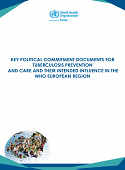Key political commitment documents for tuberculosis prevention and care and their intended influence in the WHO European Region (2019)

Download
This analytical report reviews and discusses the potential role and influence of political commitment in implementing endorsements and conducting policy in the field of tuberculosis (TB) prevention and care. It promotes discussion by comparing and analysing the extent to which selected international commitments, set out in declarations and other committal documents between 2000 and 2018, may have translated into sustainable action. This reflection is relevant and timely, as the United Nations high-level meeting (UNHLM) on TB recently took place, offering countries the opportunity to take stock of progress made, refocus efforts, and step up global commitments to achieve the United Nations Sustainable Development Goal of eliminating TB by 2030.
Literature identified in the context of developing this report (technical reports, peer-reviewed publications and grey literature) recognizes the 2007 Berlin Declaration as a milestone in committing countries to multiply their TB prevention and care efforts, and underlines the key role of political commitment, good governance and accountability in achieving set targets to combat TB. The report offers definitions of these three ideas.
To guide countries to a more systematic follow up on their commitments, any future accountability framework, for example destined to facilitate the follow-up of the implementation of the declaration resulting from the recent TB UNHLM should be multisectoral, involving stakeholders across sectors, across borders and across illnesses. It should include existing (often health-related) tools and indicators but also present new monitoring and evaluating mechanisms that focus on the co-determinants of TB infection, allowing countries with different health-financing contexts and at different stages of economic growth to put them to use. Such a multisectoral accountability framework shall be user-friendly, as it is conceptualized to blend with existing country-level recording and reporting activities. Adequate feedback mechanisms at different levels, including national, regional and global, are suggested.



